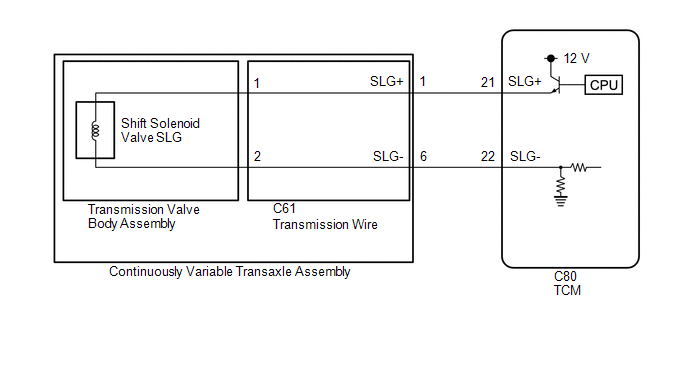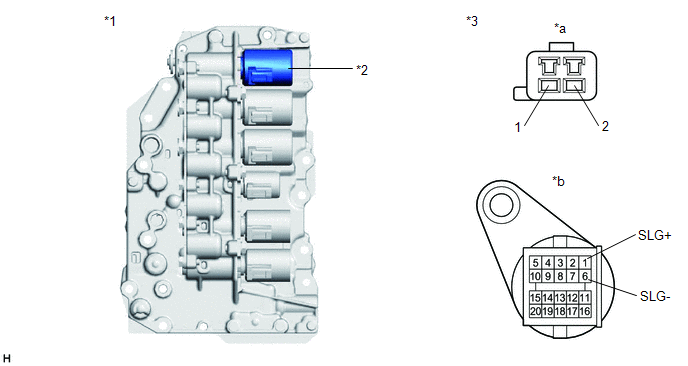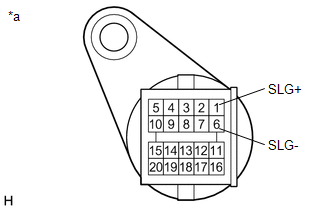- DTC judgment completed
- System normal
| Last Modified: 07-31-2024 | 6.11:8.1.0 | Doc ID: RM100000001D0XP |
| Model Year Start: 2019 | Model: Corolla Hatchback | Prod Date Range: [06/2018 - 09/2022] |
| Title: K120 / K121 (CVT): K120 CONTINUOUSLY VARIABLE TRANSAXLE SYSTEM: P08C312; Pressure Control Solenoid "M" Circuit Short to Battery; 2019 - 2022 MY Corolla Corolla Hatchback [06/2018 - 09/2022] | ||
|
DTC |
P08C312 |
Pressure Control Solenoid "M" Circuit Short to Battery |
DESCRIPTION
Using the current from the TCM, the shift solenoid valve SLG controls the B1 brake when the shift lever is in R, and S1 synchronizer when the shift lever is in P, N, D or M.
|
DTC No. |
Detection Item |
DTC Detection Condition |
Trouble Area |
MIL |
Memory |
Note |
|---|---|---|---|---|---|---|
|
P08C312 |
Pressure Control Solenoid "M" Circuit Short to Battery |
A short to +B is detected in the shift solenoid valve SLG circuit for 1 second or more (1-trip detection logic). |
|
Comes on |
DTC stored |
SAE Code: P08CB |
MONITOR DESCRIPTION
This DTC indicates a short to +B in the shift solenoid valve SLG circuit. If there is a short to +B in the shift solenoid valve SLG circuit, the TCM detects the malfunction, illuminates the MIL and stores this DTC.
MONITOR STRATEGY
|
Related DTCs |
P08CB: Pressure control solenoid "M" (Shift solenoid valve SLG)/Range check (High voltage) |
|
Required sensors/Components |
Shift solenoid valve SLG |
|
Frequency of operation |
Continuous |
|
Duration |
1 sec. |
|
MIL operation |
Immediate |
|
Sequence of operation |
None |
TYPICAL ENABLING CONDITIONS
All
|
The monitor will run whenever the following DTCs are not stored |
None |
|
Solenoid current cut status |
Not cut |
|
Engine switch |
On (IG) |
|
Starter |
OFF |
|
Battery voltage |
10.5 V or more |
|
Target current (0.1 sec. or more) |
0.2 A or more |
TYPICAL MALFUNCTION THRESHOLDS
|
Solenoid negative terminal voltage level |
High |
|
Solenoid negative terminal voltage monitor |
No signal |
COMPONENT OPERATING RANGE
|
Solenoid negative terminal voltage monitor |
Signal input |
CONFIRMATION DRIVING PATTERN
CAUTION:
When performing the confirmation driving pattern, obey all speed limits and traffic laws.
HINT:
- Connect the Techstream to the DLC3.
- Turn the engine switch on (IG) and turn the Techstream on.
- Clear the DTCs (even if no DTCs are stored, perform the clear DTC procedure).
- Turn the engine switch off and wait for 2 minutes or more.
- Turn the engine switch on (IG) and turn the Techstream on.
- Start the engine.
-
Perform the D Position Shift Test inspection in Road Test. [*1]
HINT:
[*1]: Normal judgment procedure.
The normal judgment procedure is used to complete DTC judgment and also used when clearing permanent DTCs.
- Stop the vehicle.
- Enter the following menus: Powertrain / Transmission / Utility / All Readiness.
- Input the DTC: P08C312.
-
Check the DTC judgment result.
Techstream Display
Description
NORMAL
ABNORMAL
- DTC judgment completed
- System abnormal
INCOMPLETE
- DTC judgment not completed
- Perform driving pattern after confirming DTC enabling conditions
N/A
- Unable to perform DTC judgment
- Number of DTCs which do not fulfill DTC preconditions has reached ECU memory limit
HINT:
- If the judgment result shows NORMAL, the system is normal.
- If the judgment result shows ABNORMAL, the system has a malfunction.
- If the judgment result shows INCOMPLETE or N/A, perform the normal judgment procedure again.
WIRING DIAGRAM

CAUTION / NOTICE / HINT
NOTICE:
PROCEDURE
|
1. |
INSPECT TRANSMISSION WIRE (SHIFT SOLENOID VALVE SLG) |
|
(a) Disconnect the C61 transmission wire connector. |
|
(b) Measure the resistance according to the value(s) in the table below.
Standard Resistance:
|
Tester Connection |
Condition |
Specified Condition |
|---|---|---|
|
1 (SLG+) - Other terminals |
Always |
10 kΩ or higher |
|
6 (SLG-) - Other terminals |
Always |
10 kΩ or higher |
(c) Connect the C61 transmission wire connector.
| NG |

|
|
|
2. |
CHECK HARNESS AND CONNECTOR (TRANSMISSION WIRE - TCM) |
(a) Disconnect the C80 TCM connector.
(b) Measure the resistance according to the value(s) in the table below.
Standard Resistance:
|
Tester Connection |
Condition |
Specified Condition |
|---|---|---|
|
C80-21 (SLG+) - Other terminals |
Always |
10 kΩ or higher |
|
C80-22 (SLG-) - Other terminals |
Always |
10 kΩ or higher |
(c) Connect the C80 TCM connector.
| NG |

|
REPAIR OR REPLACE HARNESS OR CONNECTOR (TRANSMISSION WIRE - TCM) |
|
|
3. |
REPLACE TCM |
(a) Replace the TCM.
| NEXT |

|
PERFORM REGISTRATION AND INITIALIZATION |
|
4. |
INSPECT TRANSMISSION WIRE |
(a) Disconnect the C61 transmission wire connector.

|
*1 |
Transmission Valve Body Assembly |
*2 |
Shift Solenoid Valve SLG |
|
*3 |
Transmission Wire |
- |
- |
|
*a |
Shift Solenoid Valve Side |
*b |
Wire Harness Connector Side |
(b) Disconnect the transmission wire connector from the shift solenoid valve SLG.
(c) Measure the resistance according to the value(s) in the table below.
Standard Resistance:
|
Tester Connection |
Condition |
Specified Condition |
|---|---|---|
|
1 (shift solenoid valve side) or 1 (SLG+) (wire harness connector side) - All other terminals |
Always |
10 kΩ or higher |
|
2 (shift solenoid valve side) or 6 (SLG-) (wire harness connector side) - All other terminals |
Always |
10 kΩ or higher |
| NG |

|
|
|
5. |
REPLACE TRANSMISSION VALVE BODY ASSEMBLY |
(a) Replace the transmission valve body assembly.
| NEXT |

|
PERFORM REGISTRATION AND INITIALIZATION |
|
|
|
![2019 - 2022 MY Corolla Corolla Hatchback [06/2018 - 09/2022]; K120 / K121 (CVT): K120 CONTINUOUSLY VARIABLE TRANSAXLE SYSTEM: DTC CHECK / CLEAR](/t3Portal/stylegraphics/info.gif)

